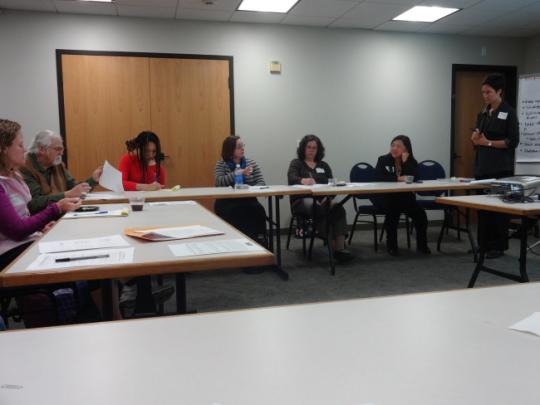Developing and Sustaining a Community-Based Participatory Research Initiative:
A Skill Building Workshop
"CBPR builds on strengths and resources within the community."
"Applied learning," "balance of power," "learning what the community wants," and "enhancing student learning" is what faculty participants said comes to mind when they think about Community Based Participatory Research (CBPR). When asked what their goals were for attending the Developing and Sustaining a Community-Based Participatory Research Initiative: A Skill Building Workshop, Art Warmoth in Psychology explained, "My goal is to get Hutchins students involved in studying poverty with the Roseland district." "I always want to keep up with research and make sure I'm benefiting in my approach," says sociology professor Elaine Wellin. This are just some of the many examples of what community-based participatory research can accomplish.
"Unlike research done 'on' or 'in' a community by an institution, research is conducted with the community as a full partner," explained workshop participant Beth Warner. Community-based participatory research, or CBPR, is a "collaborative approach to research that equitably involves all partners in the research process and recognizes the unique strengths that each brings." If used fully, CBPR holds a lot of potential to help researchers while helping to solve a problem and making a difference in the community.
Each spring, the Center for Community Engagement hosts a workshop to help faculty discover the potential of CBPR. This year, guest speakers Kara Connors and Katherine (Kathy) Kim presented. Kara is an MPH education consultant in pediatric health promotion and a former associate Director of Community-Campus Partnerships for Health (CCPH). She has extensive experience with designing competency-based faculty development programs, both in-person and web-based. While at CCPH, she coordinated the Health Professions Schools in Service to the Nation Program, a demonstration of service-learning in the health professions. Kathy is a CBPR researcher and faculty member at San Francisco State University Health Equity Institute. Together, they delved into many aspects of CBPR including sharing case studies which illustrated principles for successful development, challenges encountered, and strategies for improvement.
Kara spoke about the basics of CBPR, including the benefits of CBPR and the principles which recognize the community as a unit of identity. "There are just as many principles for this practice as there are definitions of CBPR, which builds on strengths and resources within the community which involves a cyclical and iterative process," Kara explained. "It integrates knowledge and action for mutual benefit of all partners working together. Not only does CBPR help the community but it also promotes a co-learning and empowering process that attends to social inequalities."
Kara explained the benefits of CBPR to institutional and community partners. Institutional partners learn more about local resources and services. They also gain a good understanding of community history, culture and dynamics and how interventions in other communities may or may not apply to local circumstances. While community partners obtain data that validates their concerns to the "outside world," they also gain an understanding of institutional history, culture and dynamics and how certain decisions about research design could impact the credibility of the results.
After Kara wrapped up her presentation on CBPR, Katherine went on to speak about her projects. Katherine has conducted two CBPR projects focusing on mobile health and undeserved youth. The iN Touch project examined the use of a mobile self-tracking application for overweight/obese teenagers who are at risk for depression. They partnered with Mission High School in San Francisco on a 6-month intervention with the students using iPod Touches. Use of the iPod Touch not only served as a data collection tool, but also Kathy "wanted something this community would be able to use."
We also learned about the Enhancing Tribal Health and Food Security in the Klamath Basin of Oregon and California by Building a Sustainable Regional Food System project. It examined the use of mobile tools in a Karuk Tribe youth that led community health/food assessment and a mobile adventure walking game developed by the youth. The goal of this project was to build a sustainable regional food system in the Klamath Basin that results in healthy communities, ecosystems and economies among the Karuk, Yurok and Klamath Indian Tribes. It was important that the "youth decide and the youth lead," Kathy explained. Once again, they used the iTouch to encourage participation in this project and to demonstrate the use of mobile technology. The research showed that there was a moderately strong positive correlation between making healthy food choices and not being physically active. Kathy explained, "everything we chose was with the purpose of having sustainability for the tribe."
Once the presentation was over, Kara and Kathy went on to talk about sustaining their CBPR efforts by increasing and understanding sustainability along with developing criteria to help determine what to continue in their practice. The faculty were able to take away how to use CBPR to develop deep partnerships.
Read about last year's CBPR workshop and stay tuned to hear about next year!

Author: Marie Rich





